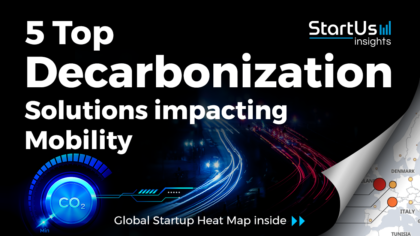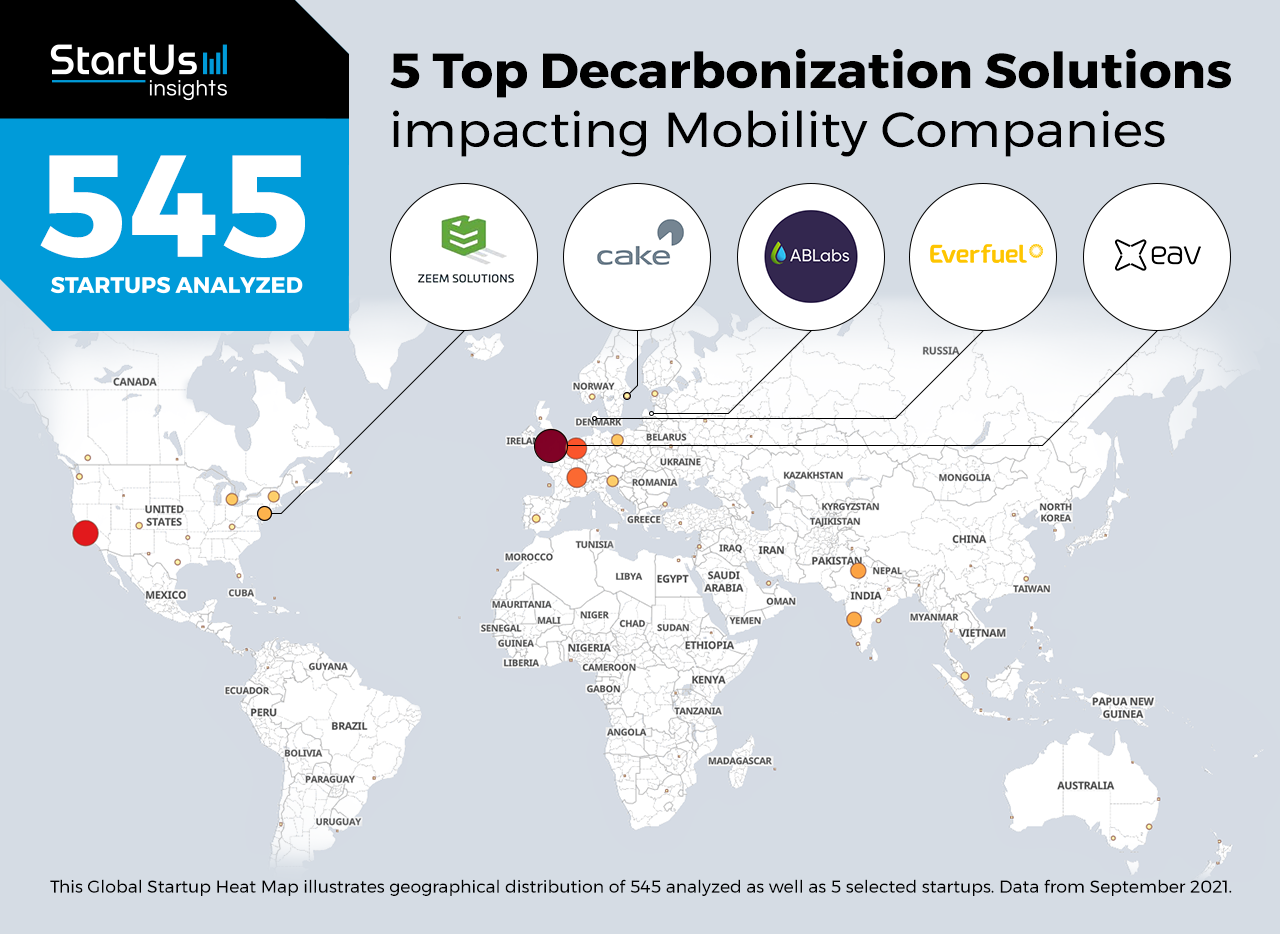Staying ahead of the technology curve means strengthening your competitive advantage. That is why we give you data-driven innovation insights into the mobility industry. This time, you get to discover 5 hand-picked decarbonization solutions impacting mobility companies.
Out of 545, the Global Startup Heat Map highlights 5 Top Decarbonization Solutions impacting Mobility Companies
The insights of this data-driven analysis are derived from the Big Data & Artificial Intelligence-powered StartUs Insights Discovery Platform, covering 2 093 000+ startups & scaleups globally. The platform gives you an exhaustive overview of emerging technologies & relevant startups within a specific field in just a few clicks.
The Global Startup Heat Map below reveals the distribution of the 545 exemplary startups & scaleups we analyzed for this research. Further, it highlights 5 mobility startups that we hand-picked based on criteria such as founding year, location, funding raised, and more. You get to explore the solutions of these 5 startups & scaleups in this report. For insights on the other 540 decarbonization solutions impacting mobility companies, get in touch.
Zeem drives Fleet Electrification
For the mobility sector, electrification is the primary method of decarbonization. But the high initial investment and the concerns of using new technology are hindering the complete electrification of fleet services. This is why startups and scaleups are developing electric vehicle (EV) solutions that ease the transition from diesel to zero-emission vehicle fleets. These solutions speed up the decarbonization of fleet vehicles that carry out essential services, hence reducing the carbon footprint of the economy.
Zeem is a US-based startup providing fleet electrification solutions. The startup’s services start from the purchase of EVs, helping fleet owners optimize the purchase through constant updates about superior products and available incentives or subsidies. Zeem’s fleet management solution is product agnostic and is customizable to suit the transportation requirements of each user. The solution also provides battery charging optimizations and V2G energy management, further improving the sustainability of fleet operations.
Cake develops Off-road Electric Bikes
Two-wheelers are a major mode of commute, especially in developing countries. This makes the electrification of bikes and scooters critical for achieving decarbonization goals. But places where the maintenance of road infrastructure is poor present a challenge to the transition to electric bikes. This is why startups and scaleups are developing electric bikes that are capable of navigating difficult terrains.
Cake is a Swedish startup that develops high-performance electric two-wheelers. The startup’s bike has a modular design that reduces the number of moving parts and minimizes complexity. Cake provides the provision for adding heat and cold boxes enabling the use of their bikes for high-end food and courier delivery. In this way, Cake’s bikes help decarbonize the mobility sector in difficult terrains.
Everfuel delivers Green Hydrogen
Hydrogen is a clean-burning fuel that produces zero carbon emissions. But the process of producing hydrogen mostly utilizes fossil-fired energy sources. This prevents the complete decarbonization of vehicles that use hydrogen as fuel. To address this, energy startups and scaleups are developing solutions that enable the cost-effective distribution of green hydrogen to speed up the transition to hydrogen fuel.
Danish startup Everfuel provides green hydrogen supply and fueling solutions. The startup’s solution produces hydrogen when renewable electricity is physically available which reduces energy costs by using only the surplus energy. This provides the power grid an efficient energy storage facility and increases the efficiency of renewable energy production. Everfuel connects vehicle manufacturers to the entire hydrogen value chain and seamlessly provides clean hydrogen fuel to their customers.
EAV enables Sustainable Last-Mile Delivery
With the advent of COVID-19, the higher dependence on food and parcel delivery services has increased the deployment of more vehicles for last-mile delivery. Most of these delivery vehicles are bikes and vans that use fossil fuels that further contribute to carbon emissions. This is why startups and scaleups are developing last-mile delivery solutions that do not use conventional fuels. These solutions also optimize fuel consumption for frequent start-stop operations.
UK-based startup EAV develops sustainable last-mile delivery solutions. The startup produces lightweight commercial vehicles that operate by pedaling with electric motor assistance which maximizes the load-carrying capacity. In addition to being zero-emission vehicles, EAV uses bio-recyclable and locally sourced materials for their bodywork. The startup thus provides a completely carbon-free last-mile delivery solution.
ABLabs develops Dual-fuel Systems
Almost all long-haul vehicles are diesel-powered, producing large amounts of carbon emissions. Due to the long lifetimes of these vehicles, a sudden conversion to electric vehicles is infeasible for most fleet operators. This is why startups and scaleups are developing retrofit solutions that enable using the existing vehicle with lower carbon emissions. These solutions allow fleet owners to contribute towards decarbonization with minimal investments.
ABLabs is a Latvian startup that develops dual-fuel technologies for diesel engines. The startup’s patented dual-fuel solution, Artusystem, allows diesel engines to operate with a mix of LPG as a primary fuel and use 20% diesel as a secondary fuel. It is easy to install and doesn’t require any engine modifications. The use of LPG reduces emissions and the more efficient combustion reduces fuel consumption, enabling fleet operators to save costs while decarbonizing their operations.
Discover more Mobility Startups
Mobility startups such as the examples highlighted in this report focus on wireless charging, vehicle-to-grid (V2G), and electric vehicles. While all of these technologies play a major role in advancing the mobility industry, they only represent the tip of the iceberg. To explore more mobility technologies, simply get in touch to let us look into your areas of interest. For a more general overview, you can download our free Mobility Innovation Report to save your time and improve strategic decision-making.









